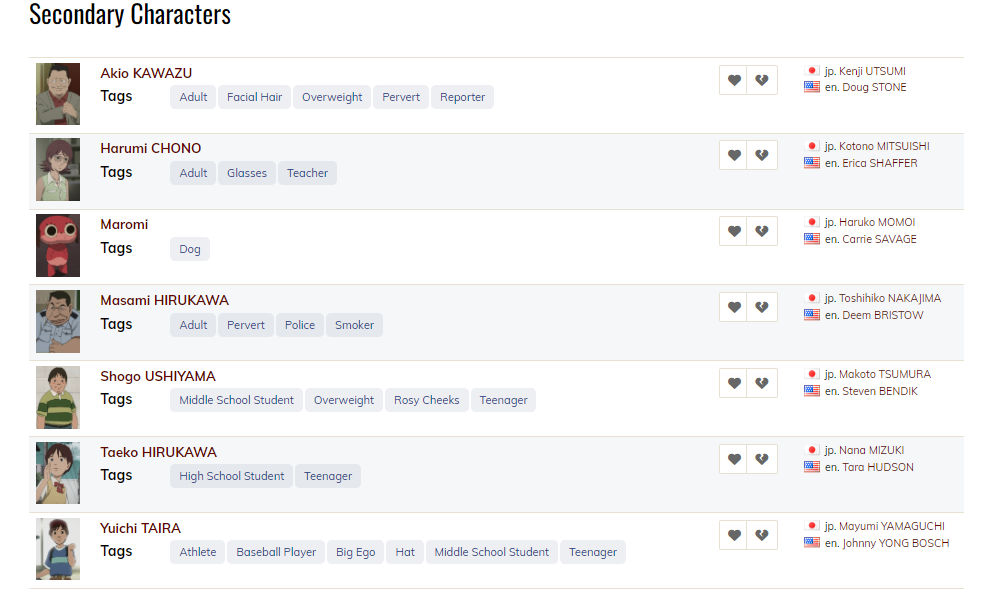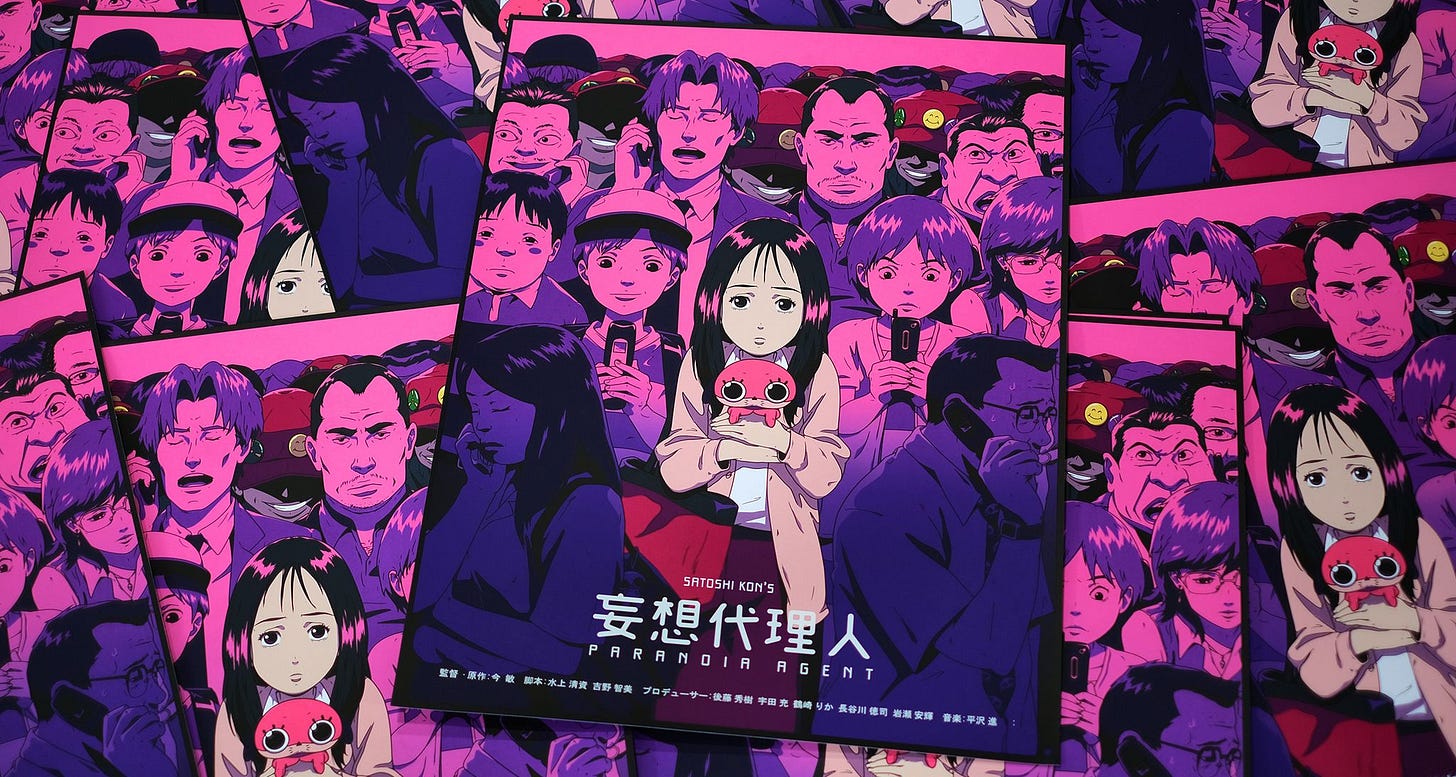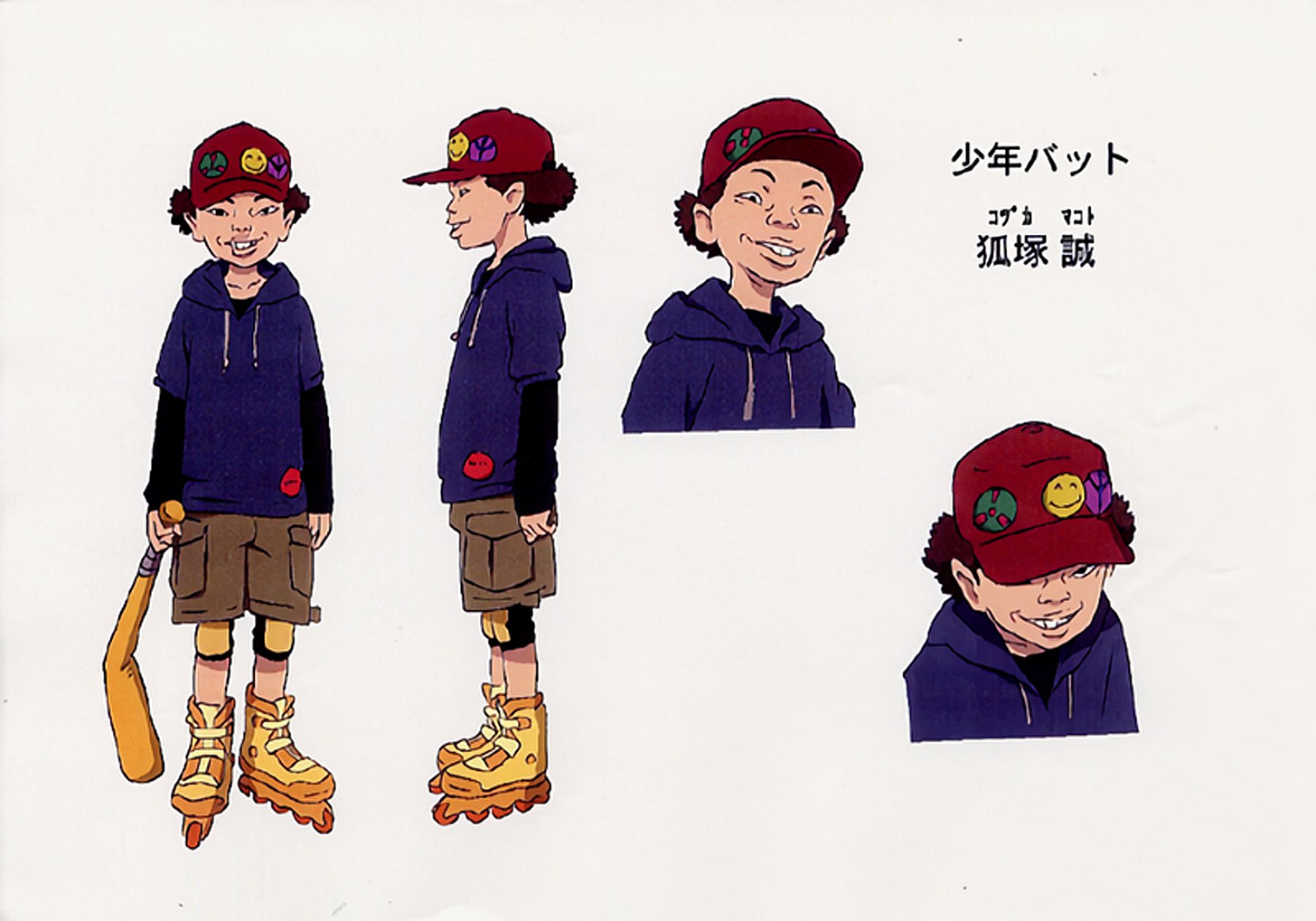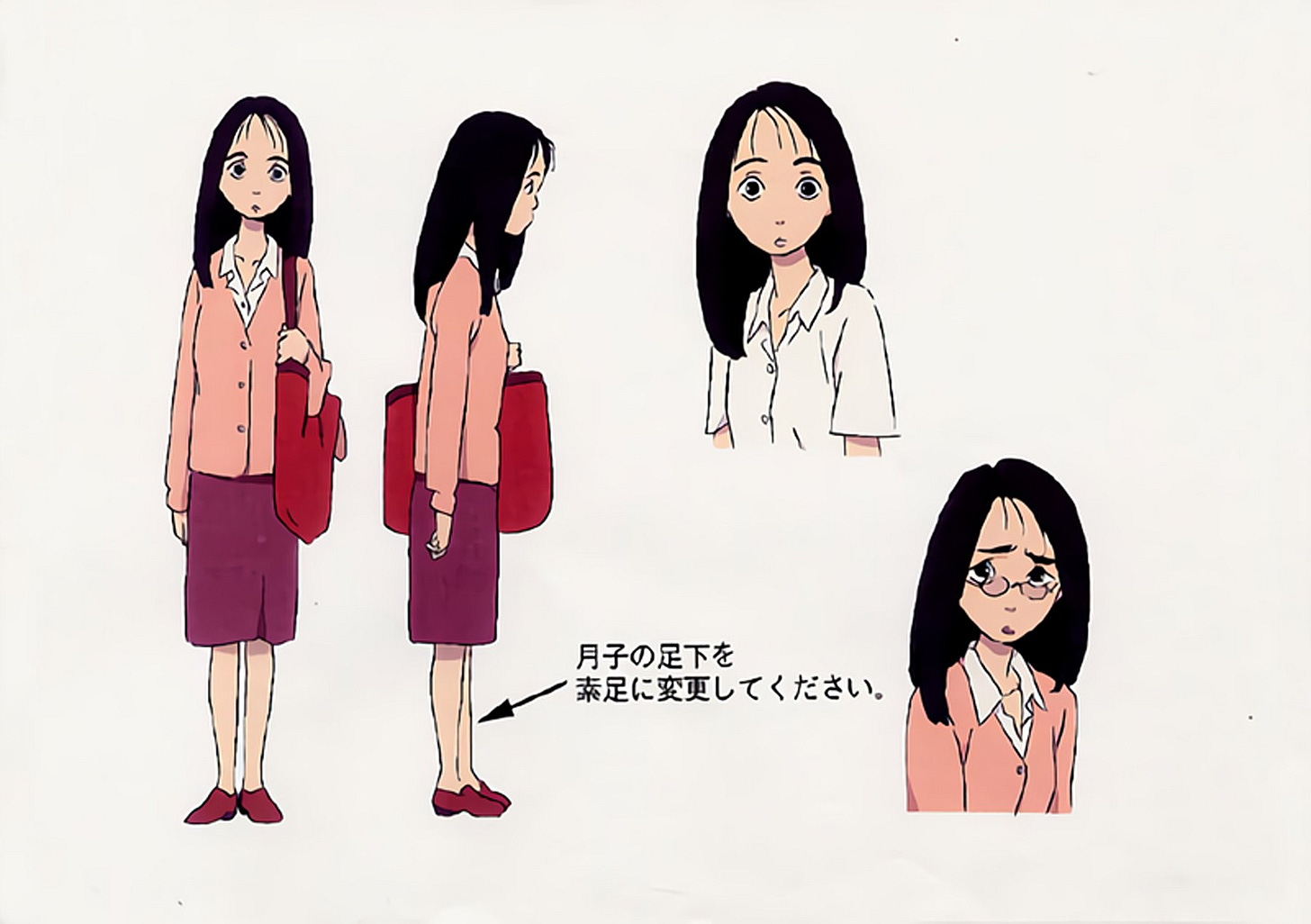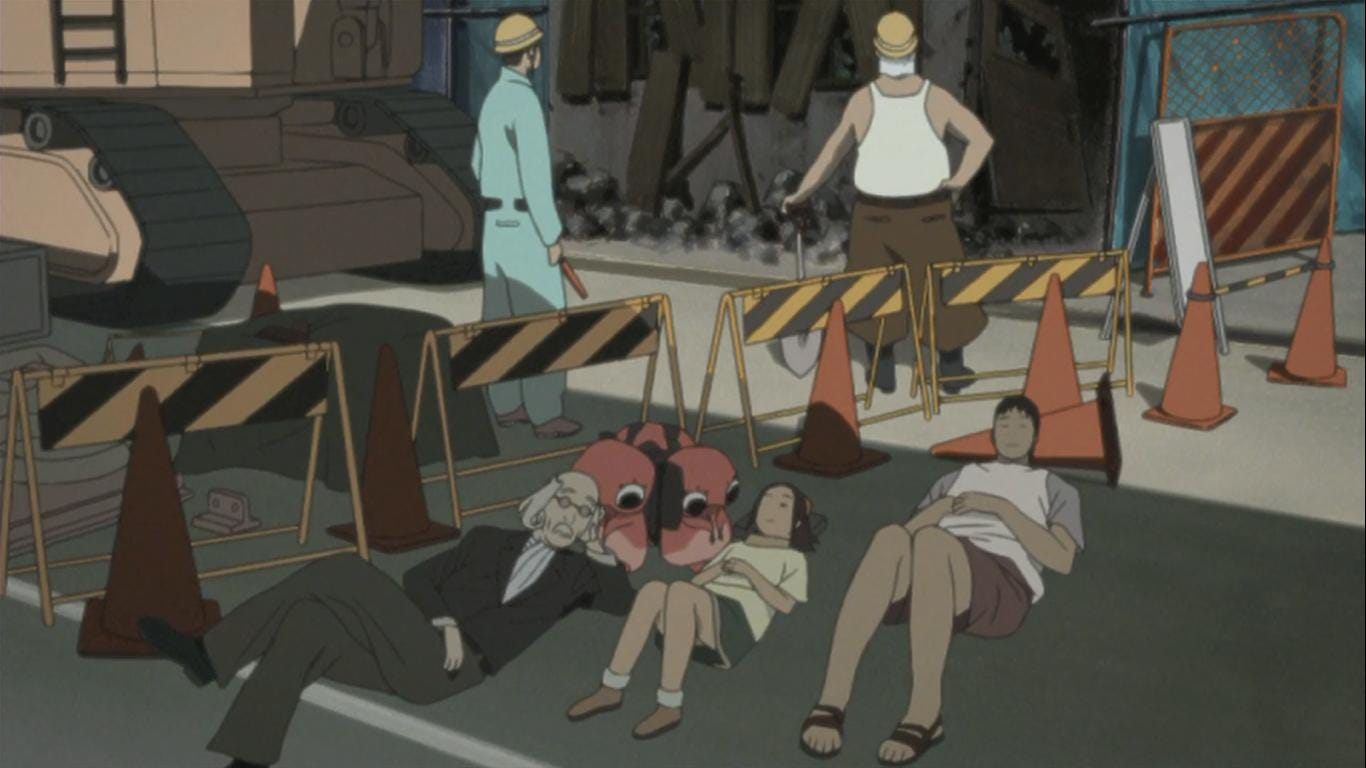Flashback Friday: Paranoia Agent
A 20th Anniversary Retrospective: The Impact of 'Paranoia Agent'
Today marks the 20th anniversary of one of my favorite animated TV shows, created by one of my personal idols: 'Paranoia Agent' by the iconic Satoshi Kon. So, this seems like the perfect time to start a series called 'Flashback Friday,' where I reflect on some of my favorite TV shows and movies ever made.
For those unfamiliar with this show, here's a brief introduction that will help you understand this article better if you've never watched it before, but I highly suggest you do. 'Paranoia Agent' is a Japanese anime television series created by director Satoshi Kon and produced by Madhouse. The show tackles many psychological themes and is regarded as one of the most incredible works in this genre.
Set in Musashino, Tokyo, 'Paranoia Agent' unfolds as a psychological horror—an uncommon feat in the anime medium—centered around a social phenomenon sparked by a juvenile serial assailant known as 'Lil' Slugger.' Its narrative intricately weaves together the experiences of victims and the efforts of detectives entangled in unraveling the mystery. Exploring themes of individual and societal anxiety, depression, and other mental struggles, the series presents a disturbingly original narrative, peeling back the layers of society's fractured psyche. Renowned for its unique and gripping storytelling, 'Paranoia Agent' sustains palpable intensity throughout its entirety.
Character Analysis
In 'Paranoia Agent,' a diverse ensemble of characters takes center stage, each grappling with their own motivations and dilemmas that intricately shape the overarching narrative. Among the key figures are Tsukiko Sagi, a character designer renowned for her creation, Maromi; Keiichi Ikari, the lead detective tasked with investigating the elusive Lil' Slugger; Mitsuhiro Maniwa, Ikari's dedicated police colleague; and Lil' Slugger (Shonen Bat) himself, the enigmatic perpetrator behind the unsettling events in Musashino, Tokyo.
With each episode focusing on a different character, their narratives intertwine to weave a complex tapestry that unearths themes of personal and societal turmoil, including anxiety, depression, and other psychological battles. Tsukiko Sagi grapples with the pressures of creativity, while Keiichi Ikari navigates the challenges of caring for his ailing wife. Meanwhile, Mitsuhiro Maniwa's fascination with the case pushes him to the brink of sanity in his pursuit of answers.
In addition to the main characters mentioned earlier, "Paranoia Agent" features several other significant characters, each grappling with their own unique struggles and motivations that impact the story. Here are a few more characters and what they are struggling with:
Harumi Chono: A middle-aged woman who claims to have been attacked by Lil' Slugger. She is obsessed with collecting various items related to the attacks and becomes increasingly unhinged as the series progresses.
Shogo Ushiyama: A popular psychologist who specializes in treating victims of the Lil' Slugger attacks. He harbors his own dark secrets and becomes entangled in the investigation.
Masami Hirukawa: A freelance journalist investigating the Lil' Slugger case. He is determined to uncover the truth behind the attacks but finds himself confronting his own inner demons along the way.
Taeko Hirukawa: Masami Hirukawa's wife, who is suffering from a terminal illness. Her deteriorating health adds to Masami's stress and influences his actions throughout the series.
Yuichi Taira: A troubled student who becomes obsessed with Lil' Slugger and his attacks. He struggles with feelings of isolation and alienation, finding solace only in his connection to the mysterious assailant.
These characters, along with others in the series, contribute to the complex web of narratives and themes explored in "Paranoia Agent." Their individual stories intersect and intertwine, adding layers of depth and intrigue to the overall plot.
Themes and Symbolism
'Paranoia Agent' delves deep into a multitude of themes and employs rich symbolism throughout its narrative, inviting viewers to contemplate the complexities of the human psyche and society at large.
One prominent theme explored in the series is the fragility of reality and the blurred lines between perception and truth. As the characters grapple with their own anxieties and delusions, the viewer is drawn into a world where paranoia and uncertainty reign supreme. This theme is reinforced through surreal imagery, nonlinear storytelling, and recurring motifs that challenge conventional notions of reality.
Additionally, 'Paranoia Agent' explores the impact of societal pressures and the consequences of collective denial. Through the lens of the Lil' Slugger attacks, the series examines the ways in which individuals cope with stress, trauma, and the pressures of conformity. The character arcs and storylines serve as allegories for larger social issues, shedding light on the darker aspects of modern society and the human condition.
Symbolism plays a crucial role in 'Paranoia Agent,' with recurring motifs and visual metaphors adding depth and nuance to the narrative. The character of Maromi, for example, serves as a symbol of innocence and escapism in the face of chaos and despair. The recurring appearances of clocks and mirrors hint at themes of time, reflection, and self-awareness, while the omnipresent golden bat wielded by Lil' Slugger becomes a potent symbol of destruction and liberation.
Overall, 'Paranoia Agent' masterfully weaves together themes of reality, perception, societal pressure, and existential dread, offering viewers a thought-provoking exploration of the human psyche and the anxieties of contemporary life.
Art and Animation
Directed by the visionary Satoshi Kon, 'Paranoia Agent' showcases a distinctive visual style that seamlessly blends reality with surrealism. The animation is fluid and dynamic, allowing the series to transition effortlessly between everyday life and hallucinatory dreamscapes. Satoshi Kon's meticulous attention to detail is evident in every frame, with each scene meticulously crafted to evoke a specific mood or emotion.
The character designs in 'Paranoia Agent' are equally captivating, with each character expertly rendered to reflect their personality and inner struggles. From the whimsical charm of Maromi to the haunting visage of Lil' Slugger, the characters are brought to life with stunning detail and nuance. Satoshi Kon's innovative use of visual storytelling techniques, such as montages and juxtapositions, further enhances the narrative depth of 'Paranoia Agent,' allowing the series to convey complex themes and ideas in a visually engaging and thought-provoking manner.
Overall, the art and animation of 'Paranoia Agent' are a testament to Satoshi Kon's visionary talent and the creative prowess of the animation team. Through its stunning visuals and innovative storytelling techniques, the series pushes the boundaries of the anime medium, leaving a lasting impact on viewers long after the credits roll.
Impact and Legacy
Since its debut twenty years ago, 'Paranoia Agent' has left an indelible mark on the anime landscape, earning acclaim for its innovative storytelling and thought-provoking themes. Directed by the amazing Satoshi Kon, the series pushed the boundaries of the medium, captivating audiences with its blend of psychological horror, surrealism, and social commentary.
'Paranoia Agent' has influenced a generation of creators and continues to be celebrated for its unique vision and narrative complexity. Its exploration of themes such as societal pressure, existential angst, and the nature of reality has resonated with viewers around the world, sparking discussions and inspiring countless works of art and media.
The legacy of 'Paranoia Agent' extends beyond its initial run, with its impact still felt in the anime community today. Its enduring popularity and critical acclaim serve as a testament to the enduring power of Satoshi Kon's storytelling and the timeless relevance of its themes. As a groundbreaking work of anime, 'Paranoia Agent' remains a touchstone for fans and creators alike, cementing its place in the pantheon of anime classics.
Personal Reflection
Paranoia Agent has been my favorite anime for a long time. It resonated deeply with me the first time I watched it, as I was also struggling with a lot of internal mental health problems at that time. It awakened something in me, making me look at my own problems and those of others from a different angle. It showed that anime can be dark, gritty, and at the same time, educational and impactful like nothing else. It explored so many themes and problems in only 13 episodes.
My favorite episode by far was episode 8, "Happy Family Planning." In this episode, viewers embark on an emotional journey through themes of suicide, experiencing a blend of discomfort, fascination, and profound insight. Initially, the episode introduces three seemingly disconnected characters—Kamome, Zebra, and Fuyubachi—each grappling with thoughts of suicide for distinct reasons. Despite the weighty subject matter, the episode maintains an upbeat tone, showcasing borderline-wacky antics as the trio navigates their contemplations of ending their lives. This seemingly lighthearted portrayal of such a sensitive topic may raise eyebrows, but with Satoshi Kon at the helm, unexpected depths are to be expected.
As the story unfolds, Satoshi Kon's adept storytelling prowess reveals layers of complexity within each character's inner struggles. Through subtle directorial choices and intricately woven details, such as the revelation of the enigmatic "FOX" in the suicide chatroom and the symbolic presence of a condom dispenser labeled "Happy Family Planning," Kon invites viewers to delve deeper into the psyche of the characters and the broader thematic undercurrents of the episode. Despite the almost-comical tone permeating the narrative, Kon's portrayal of suicide remains both poignant and authentic, capturing the characters' conflicted emotions and tentative actions with a delicate touch.
For those resonating with similar emotional turmoil, "Happy Family Planning" serves as a profound exploration of the complexities surrounding suicide and the imperative nature of seeking assistance. Its depiction of the human experience, replete with its trials and triumphs, strikes a chord, rendering it not merely a standout episode of "Paranoia Agent," but also a compelling testament to Satoshi Kon's narrative finesse. Through its insightful examination of challenging themes, the episode encourages empathy and dialogue, fostering crucial discussions regarding mental health and the intricacies of the human condition.
If you've never watched this anime before, do yourself a favor and give it a try; it will open up a new world for you. Also, check out other iconic works by Satoshi Kon; chances are you've already seen some of his impact on big Hollywood releases such as Inception, which has drawn inspiration from Satoshi Kon's creations.
If you are more of a visual learner, this analysis by Super Eyepatch Wolf is a big recommendation from me if you want to understand this show even better.







